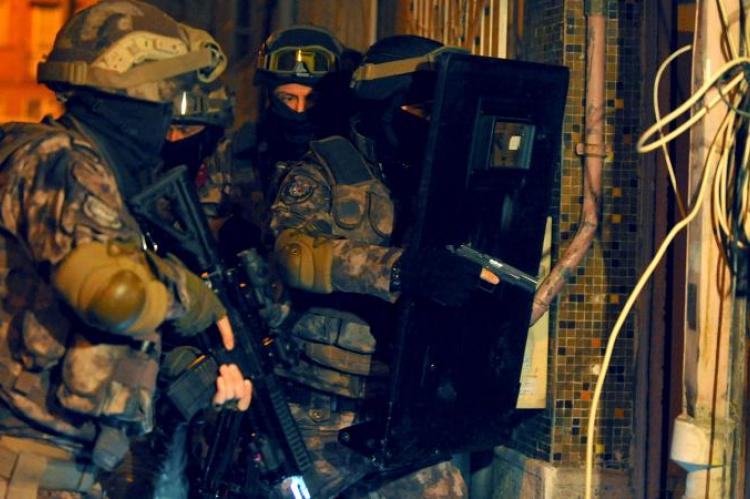Claim: Turkey helped the rise of DAESH in the first place
Foreign Policy article written by Ahmet S. Yayla and Colin P. Clarke includes numerous mistakes on Turkey’s policy against DAESH
On 12 April 2018, Foreign Policy published an article titled “Turkey’s Double ISIS Standard,” written by Ahmet Sait Yayla and Colin P. Clarke. However, the article includes numerous factual mistakes and inconsistencies regarding Turkey’s policy against DAESH.
Claim: “Turkey helped DAESH rising in the first place”
Firstly, the article alleges that “Turkey’s actions or the lack thereof… helped fuel the rise of the Islamic State (DAESH) in the first place.”
Turkey is among the first nations which designated DAESH as a terrorist organization as early as 2013. Since then, Turkey has shut down 12 associations and barred 5,781 people from 146 countries from entering the country for links to DAESH according to data released by the Ministry of Interior.
Turkey’s military action against DAESH also goes back as early as January 2014, eight months before the US-led international coalition started its airstrikes in Syria against DAESH. On 24 January 2014, Turkey bombed a DAESH convoy in Syria. Turkish air forces hit DAESH targets numerous times in 2015. Additionally, Turkey opened its Incirlik Airbase for the anti-DAESH coalition in July 2015 which was described as a “game-changer development” by the Obama Administration.
Claim: “Turkey allowed DAESH militants to pass through its borders”
Secondly, the article claims that “[i]n 2013 alone, some 30,000 militants traversed Turkish soil, establishing the so-called jihadi highway, as the country became a conduit for fighters seeking to join the Islamic State (DAESH).”
Turkey shares an 822 kilometer-long border with Syria, which made it difficult to keep it totally under control regarding the passage of the would-be-militants. In addition, the article does not provide any link or source for supporting the number of 30,000 militants passing to Syria via Turkey in 2013.
Moreover, unlike what was claimed in the article, Turkey has conducted an effective campaign against DAESH from back in the emerging periods of the terror organization. Turkey deported 830 European citizens who tried to join DAESH in September 2014. By April 2015, Turkey deported 1,300 people who tried to join DAESH.
Additionally, Turkey arrested 4,700 DAESH suspects in 2017 alone. Apart from putting an entry ban on 35,690 people because of their aforementioned suspected DAESH links, Turkey captured and deported 2,896 people from 92 countries over suspicions that they would join DAESH or other terror groups in Syria.
Claim: “DAESH fighters treated in Turkish hospitals”
Thirdly, the article mentions that “[t]here are many more examples of Turkey’s passive support to Islamic State (DAESH) fighters, including wounded Islamic State (DAESH) militants treated for free at hospitals across southeastern Turkey. Among those receiving care was one of the top deputies of Islamic State (DAESH) chieftain Abu Bakr al-Baghdadi, Ahmet el-H, who was treated in a private hospital in Sanliurfa in August 2014.”
The authors give two references to this claim. The first is another article written by Ahmet S. Yayla which again refers to another article of Yayla. The second reference is being made to an article published in Express, referring to another article published in Russia Today. The Russia Today article was published in May 2016 while the relations between Turkey and Russia was in a tense period over the shooting-down of the Russian military jet by the Turkish Airforce on 24 November 2015. However, Foreign Policy itself described Russia Today as a “Russian propaganda organ” while Yayla and Clarkes used it as a source of their claim in their Foreign Policy article.
Claim: “Turkey engaged in oil trade with DAESH”
Finally, the authors bring the claim of Turkey engaging in the oil trade with DAESH, again an unfounded and outdated claim which was first invoked in the Russian media outlets following the crash of the Russian military jet in November 2015. The article also gives reference to another Foreign Policy article which voiced the statements of Russian officials during the Russia-Turkey diplomatic crisis, but also stated that “energy experts didn’t give much credence to the Russian claims.”
In addition to these problems regarding Russia’s alleged ‘proofs’, many statements have been made denying the allegations of Russia. U.S. State Department spokesman Mark Toner rejected these allegations, saying: “There is no Turkish government complicity in some operation to buy illegal oil from the DAESH. We just don’t believe that to be true in any way, shape or form."
Also, German Foreign Ministry's then-spokesperson and the Iraqi Kurdistan Regional Government's Energy Commission's then-chairman rejected such allegations when they erupted in the Russian Media in late 2015.
To have a deeper knowledge about the issue, read our fact-check on the claim of the oil trade between Turkey and DAESH.



